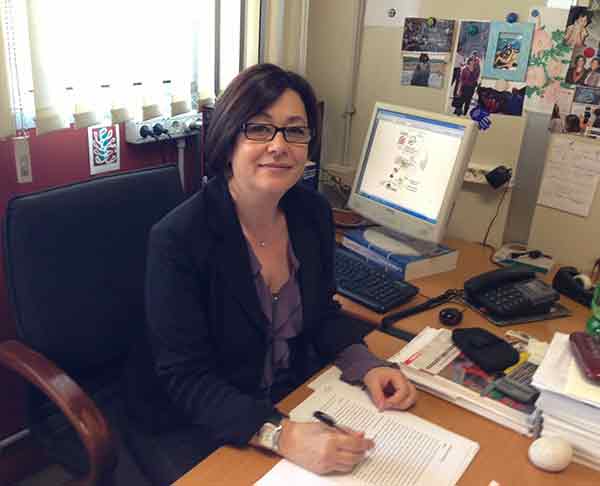Member of the National board reviewer of the Italian Ministry of Education, Universities and Research
Research;
– Referee for VQR (Evaluation of Research Quality);
– Grant reviewer for “Regione Calabria”, University of Padua; Israel Science Foundation; National
Science Center of Poland; InBev-Baillet Latour Grants for Medical Research.
– Guest Editor for Antioxidants & Redox Signaling and International Journal of Cell Biology.
– Task Force Member (Validation Team) of the Halifax Project “Getting to Know Cancer”.
Society Memberships
Italian Society of Biochemistry (SIB); Society for Free Radical Research (SFRR); National Interuniversity Consortium I.N.B.B. (Institute National Biostructure and Biosystems); National Health committee on the evaluation of copper risk assessment; INCT Redoxoma; European Association for the Study of Diabetes (EASD).
Editorial Board Member
Scientific Reports; Genes & Nutrition; The open Nitric Oxide Journal; Frontiers in Cancer Molecular Targets and Therapeutics; MAP Kinase; Trends in Cell & Molecular Biology; Journal of Cancer Metastasis and Treatment; Reactive Oxygen Species.
Funding (latest Years)
– AIRC (Italian Association for Cancer Research) – IG – 15403 – Dissecting the Adipose triglyceride Lipase (ATGL) functions in the pathogenesis of hepatocarcinoma (2015-2018).
– CEPID – Centros de Pesquisa, Inovação e Difusão No. 2013/07937-8 Redoxome – Redox Process in Biomedicine (2013-2018).
– MIUR (Italian Ministry of Education, Universities and Research) – PRIN 2009, M8FKBB (National Scientific Coordinator), “Redox regulation of pathways involved in cellular senescence and in the age-related diseases” (2011-2013).
– FAPESP – No. 11/50318-1 Desenvolvimento de Compostos com Interesse Farmacológico ou Medicinal e de Sistemas para seu Transporte, Detecção e Reconhecimento no Meio Biológico (2011-2016).
– AIRC (Italian Association for Cancer Research) – IG – Study of the molecular players that regulate redox state, glucose fuel and autophagy in cancer cell survival (2010-2013).
– Fondazione Roma (Bank Foundation) – Intervention Program to sustain the Biomedical research
“Type 2 Diabetes Mellitus: Role of Inflammation and Innate Immunity in The Pathogenesis of
Endothelial Dysfunction and Atherosclerosis” (2009-2012).
– INCT de Processos Redox em Biomedicina – Redoxoma (Apoio FAPESP/CNPq/MCT) (2009-2014).
– MIUR (Italian Ministry of Education, Universities and Research) – PRIN 2007, 20077S9A32 (National Scientific Coordinator) “Redox mechanisms underlying cell signaling involved in the genesis of oxidative stress-related diseases” (2008-2010).
– Projeto Bilateral, Programa Executivo Brasil-Itália, Processo CNPq 490021/2008-5. Characterization of oxidative damage caused by copper complexes: molecular bases for their antitumor action”(2008).
– Italian Ministry of Health, RF-2009-1546096 “Role of recurrent herpetic infections in neuronal damage” (2007-2009).
– FIRB – (Funding for Basic Research from Italian Ministry of University and Research) – RBIP063ANC_003 “New Neurotrophic and neuroprotective drugs for therapeutic applications in neurosciences: Alzheimer’s disease, Huntington’s disease and Amyotrophic Lateral Sclerosis” (2007-2010).
– FAPESP – No. 05/60596-8 Espécies Complexas com Potencial Aplicação em Bioinorgânica, Catálise, Farmacologia e Química Ambiental: concepção, preparação, caracterização e reatividade (2006-2010).
Research field
The redox Biochemistry group actively and productively works in the field of redox-mediated cell signaling downstream of ROS and NOS-mediated processes characterizing cancer, neurodegeneration and aging. These studies highlighted for the first time that a remarkable number of proteins can fit a double role in signaling by sensing alterations of the cellular redox state by means of reactive cysteine residues.
Part of the research focused largely on the molecular mechanism linking copper metabolism and SOD1 in the pathophysiology of neuronal cell death. Two major scientific contributions are to be mentioned. The discovery of the role of glutathione as intracellular copper chelator opened a new avenue on the role of this tripeptide on cell copper delivery to macromolecules and the concept that altered SOD1(structure/function) may exert its toxic activity through mitochondrial damage in neurons, leading to oxidative stress and mishandling of nitric oxide. The group actively searched for the role of oxidative stress in the apoptotic process, discovering the active extrusion of glutathione during the early phase of the process long before the occurrence of ROS production. With the discovery of ROS-mediated signaling several redox-sensitive cellular factors were identified and the dissection of processes related to cell cycle regulation and apoptosis in several processes such as cancer, neurodegenerative diseases and viral infection were studied. In this context, fundamental results were obtained in viral infection where oxidative stress is imposed by glutathione depletion without the intervention of ROS. Therefore, exogenous glutathione possesses antiviral effect and this use was validated by a patent.
In the last years the group started to perform research in the field of nutrition and metabolic disorders, focusing on aspects related to mitochondrial function and turnover (biogenesis/mitophagy) and de-regulated metabolism of adipose tissue. In this context, important was the discovery that PGC-1 also resides in mitochondria. This study represented a seminar publication and opened the avenue for dissecting new NO-dependent signaling axis responsible for survival antioxidant response upon mild metabolic stress and/or oxidative imbalance. The goals of this research consist in identifying key mechanisms that link improvement of adipocytes metabolism to longevity and the avoidance of age-related chronic diseases.
Selected Publications
Ciccarone, F., Vegliante, R., Di Leo, L. and Ciriolo, M.R. The TCA cycle as a bridge between oncometabolism and DNA transactions in cancer. Semin Cancer Biol. Jun 20. pii: S1044-579X(17)30164-5. doi: 10.1016/j.semcancer.2017.06.008 (2017).
Aquilano, K., Baldelli, S., La Barbera, L., Lettieri Barbato, D., Tatulli, G. and Ciriolo, M.R. Adipose triglyceride lipase decrement affects skeletal muscle homeostasis during aging through FAs-PPARα-PGC-1α antioxidant response. Oncotarget. 2016 Apr 1. doi: 10.18632/oncotarget.8552.
Vegliante, R., Desideri, E., Di Leo, L. and Ciriolo, M.R. Dehydroepiandrosterone triggers autophagic cell death in human hepatoma cell line HepG2 via JNK-mediated p62/SQSTM1 expression. Carcinogenesis Jan 13. pii: bgw003 (2016).
Lettieri Barbato, D., Tatulli, G., Aquilano, K. and Ciriolo, M.R. Mitochondrial Hormesis Links Nutrient Restriction To Improved Metabolism In Fat Cells. Aging 7: 869-881 (2015).
Lettieri Barbato, D., Tatulli, G., Cannata, S.M., Bernardini, S., Aquilano, K. and Ciriolo, M.R. Glutathione Decrement Drives Thermogenic Program In Adipose Cells. Scientific Rep. Aug 11;5:13091. doi: 10.1038/srep13091 (2015).
Desideri, E., Vegliante, R., Cardaci, S., Nepraviahta, R., Paci, M. and Ciriolo, M.R. MAPK14/p38-dependent modulation of glucose metabolism affects ROS levels and autophagy during starvation. Autophagy 10:1652-1665 (2014).
Baldelli, S., Aquilano, K. and Ciriolo, M.R. PGC-1α buffers ROS-mediated removal of mitochondria during myogenesis. Cell Death Dis. 10.1038/cddis.2014.458. (2014).
Lettieri Barbato, D., Tatulli, G., Aquilano, K. and Ciriolo, M.R. FOXO1 controls lysosomal acid lipase in adipocytes: implication of lipophagy during nutrient restriction and metformin treatment. Cell Death Dis. (2013) doi: 10.1038/cddis.2013.404
Lettieri Barbato, D., Aquilano, K., Baldelli, S., Cannata, S., Bernardini, S., Rotilio, G. and Ciriolo, M.R. Proline oxidase-adipose triglyceride lipase pathway restrains adipose cell death and tissue inflammation. Cell Death & Differ. 21:113-123 (2014).
Desideri, E., Filomeni, G. and Ciriolo, M.R. Glutathione participates in the modulation of starvation-induced autophagy in carcinoma cells. Autophagy 8, 1769-1781 (2012).
Aquilano, K., Baldelli, S., Pagliei, B., Cannata, S., Rotilio,G. and Ciriolo, M.R. p53 orchestrates the PGC-1α-mediated antioxidant response upon mild redox and metabolic imbalance. Antiox. Redox Signal. 18, 386-399 (2012).
Cardaci, S., Rizza, S., Filomeni, G., Bernardini, R., Bertocchi, F., Mattei, M., Paci, M., Rotilio, G. and Ciriolo, M.R. Glutamine deprivation enhances antitumor activity of 3-bromopyruvate through the stabilization of monocarboxylate transporter-1. Cancer Res. 72, 4526–4536 (2012).
Filomeni, G., Graziani, I., De Zio, D., Dini, L., Centonze, D., Rotilio, G. and Ciriolo, M.R. Neuroprotection of kaempferol by autophagy in models of rotenone-mediated acute toxicity: possible implications for Parkinson’s disease. Neurobiol Aging 33, 767-785 (2012).
Aquilano, K., Baldelli, S., Cardaci, S., Rotilio, G. and Ciriolo M.R. Nitric oxide is the primary mediator of cytotoxicity induced by GSH depletion in neuronal cells. J Cell Sci. 124, 1043-1054 (2011).
Filomeni, G., Desideri, E., Cardaci, S., Piccirillo, S., Graziani, I., Rotilio, G. and Ciriolo, M.R. Carcinoma cells activate AMP-activated protein kinase-dependent autophagy as survival response to kaempferol-mediated energetic impairment. Autophagy 6, 202-216 (2010).


